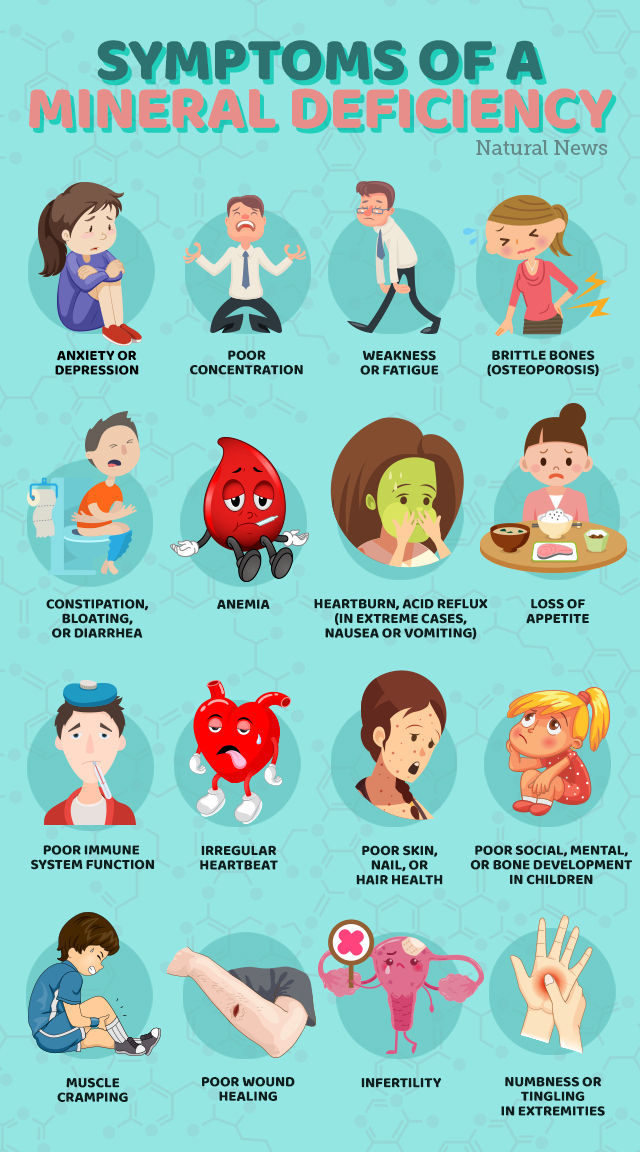Four major mineral deficiencies, their symptoms, and how to overcome them
10/16/2017 / By Derek Henry

You may think that in a society where food is abundant and starvation is relatively rare, that nutrient deficiencies would be a non-issue. However, in many parts of the world, including North America, nutrient deficiencies are extremely common and are often responsible for many of the symptoms and diseases people are facing today.
So how do these deficiencies occur in a world that has plenty of food to go around? Turns out, there are a lot of intertwining factors.
Why mineral deficiencies have become a silent epidemic
The way the current agricultural and health care systems are set up, along with the daily habits that have been created as a result, it is nearly impossible for the average person to escape a mineral deficiency in the middle stages of life. To escape a mineral deficiency, you would have had to avoid nearly all these mainstream issues:
- Poor soil conditions due to continuous tilling practices (“strip mining”), chemical applications, and poor fertilization techniques which rip out and burn up minerals in the soil
- Consumption of processed and non-organic foods that have been further stripped of their nutrients, which creates poor digestion and compromised assimilation of any nutrients that were present. [To learn more, check out Foodsupplynews.com.]
- Chronic stress
- Lack of raw and fermented food consumption, which lowers enzyme and probiotic stores (two critical factors in the digestive process)
- Low stomach acid (caused by stress and poor food consumption)
- Daily coffee consumption
- Fluoridated or contaminated water
- Excess sugar consumption
- Prescription medications
- Heavy metals (metal fillings, vaccines/flu shots, seafood, pollution)
Have you been one of the lucky ones to avoid ALL of these? Chances are you have been subject to all of them, and without specific attention to rectifying it, you are still dealing with the consequences of a mineral deficiency.
You can get a better idea if you are suffering, by noting the mineral deficiency symptoms below.
Symptoms of a mineral deficiency
Generally speaking, you may be dealing with a mineral deficiency if you are dealing with any of the following symptoms on a consistent basis:
- Anxiety or depression
- Poor concentration
- Weakness or fatigue
- Muscle cramping
- Poor immune system function
- Poor social, mental, or bone development in children
- Brittle bones (osteoporosis)
- Poor wound healing
- Infertility
- Loss of appetite
- Irregular heartbeat
- Constipation, bloating, or diarrhea
- Heartburn or acid reflux (in extreme cases, nausea or vomiting)
- Numbness or tingling in extremities
- Poor skin, nail, or hair health
- Anemia
Each of these conditions could be related to some common mineral deficiencies. Four of the most common mineral deficiencies today are magnesium, iodine, iron, and zinc.
Magnesium deficiency symptoms
A deficiency in this mineral can cause many issues, due to it’s overall importance in the body. It’s not surprising that many people deal with it, as chronic stress will deplete it, and the most absorbable forms of it are largely lacking in the diet (leafy greens). Nuts, legumes, and seeds are good forms, but unless you properly prepare them and have incredible digestion, unlocking beneficial amounts of magnesium becomes a difficult task.
Some early signs of magnesium deficiency include:
- Fatigue
- General weakness
- Loss of appetite
- Constipation
- Heartburn
If not addressed, these symptoms could become worse, and show up as the following symptoms:
- Numbness and tingling
- Muscle cramps
- Seizures
- Abnormal heart rhythms
- Acid reflux, vomiting
You may also notice increased cravings for chocolate as it is a magnesium rich food. Green leafy vegetables and properly prepared nuts and seeds are also good sources.
Iodine deficiency symptoms
Another common mineral deficiency that can have disastrous consequences for your health is iodine deficiency. According to Dr. Brownstein, revered expert and author of the book Iodine: Why You Need It, Why You Can’t Live Without It, 94.7 percent of 500 patients he tested were deficient in inorganic iodine.
Signs you are in a serious iodine deficiency include:
- Thyroid disease
- Breast disease
- Excess mucous production
- Chronic fatigue
- Lowered metabolism (can’t seem to lose weight)
- Infertility
- Cognitive issues
- Anxiety, depression, or irritability
- Fibrocystic breasts
- Hemmorhoids
- Headaches and migraines
- Keloids
- Ovarian cysts
- Cancers (breast, ovarian, thyroid, prostate)
- Subaceous cysts
If you crave salty foods, that is another nod that you may be dealing with an iodine deficiency. To replenish iodine stores, think about a high quality sea salt and seaweed.

Iron deficiency symptoms
Without proper iron levels in your blood, oxygen delivery in your body is severely compromised. This can eventually result in anemia, which will leave you feeling weak and tired on a daily basis. It can also negatively affect social and cognitive development.
If you find you like to chew on ice, that is also a signal you may be iron deficient.
Good iron sources include grass-fed beef; organic, free-range chicken; and wild-caught fish. Leafy green vegetables and blackstrap molasses are also great sources.
Special note: Drinking coffee can inhibit iron absorption, and as a result, can exacerbate an iron deficiency issue.
Zinc deficiency symptoms
Zinc is an essential mineral for proper immune system function, and a deficiency can lead to the following symptoms:
- Poor immune system health
- Slow wound healing
- Loss of appetite, taste, or smell
- Hair loss, brittle nails
You can get quality amounts of zinc from properly prepared nuts and seeds (pumpkin seeds are an excellent source), oysters, grass-fed beef, and free-range organic poultry.
There are certainly many other mineral deficiencies, but these are very common and have a high level of importance due to their requirements in the body. To help rectify a mineral deficiency in a tasty morning beverage, try the Magical Morning Remineralization Recipe.
Sources include:
Submit a correction >>
Tagged Under:
longevity, magnesium deficiency, mind body science, minerals, natural cures, natural health, natural remedies, nutrients, nutrition, supplements, trace minerals, zinc deficiency
This article may contain statements that reflect the opinion of the author






















